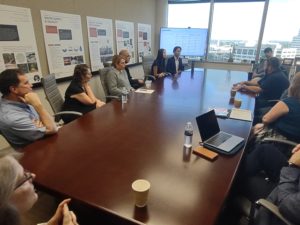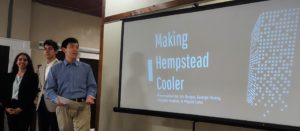The West Houston Association has been working with Rice University’s Social Science Consulting Practicum since August of 2020. Over the past four semesters, WHA has engaged over a dozen Rice University students across six projects. Students in the program interact with WHA members and partners seeking creative solutions to real-world challenges through experiential learning on all project phases from investigation and analysis, through presentation of recommendations. The two most recent collaborations wrapped up at the end of April 2020.
 The first project, presented to WHA members on April 27th, further explored what makes an area “cool” or attractive regarding entertainment, cultural, and social factors. The goal of this project was to do a deeper dive into specific elements of the “cool factor” as identified by a student team in December of 2021. The first model for how to evaluate the “cool factor” of a particular region started by identifying four cases studies that students considered “cool” and worked backwards to identify their defining traits. They then implemented the model on two other areas to gauge their “cool factor.” In this project, the students focused on diversity and ratings of dining and entertainment options as well as the availability and quality of parks in order to provide more quantitative rather than qualitative metrics. The presentation led to a robust discussion on “sense of place” and interest by WHA members to be involved with future projects. Project member Jordan Ngo said, “Working on this project for the West Houston Association gave us insight into what makes Houston neighborhoods cool and we hope that our model will be considered in the future when making plans to develop Houston.”
The first project, presented to WHA members on April 27th, further explored what makes an area “cool” or attractive regarding entertainment, cultural, and social factors. The goal of this project was to do a deeper dive into specific elements of the “cool factor” as identified by a student team in December of 2021. The first model for how to evaluate the “cool factor” of a particular region started by identifying four cases studies that students considered “cool” and worked backwards to identify their defining traits. They then implemented the model on two other areas to gauge their “cool factor.” In this project, the students focused on diversity and ratings of dining and entertainment options as well as the availability and quality of parks in order to provide more quantitative rather than qualitative metrics. The presentation led to a robust discussion on “sense of place” and interest by WHA members to be involved with future projects. Project member Jordan Ngo said, “Working on this project for the West Houston Association gave us insight into what makes Houston neighborhoods cool and we hope that our model will be considered in the future when making plans to develop Houston.”

The second project was a collaboration with the City of Hempstead, where students focused on exploring uses for a 14-acre tract of land on the northern side of town. The city hopes to develop a means by which to increase tourism and provide value for community residents. The students researched other similar situated cities and designed a community survey to gather data. In analyzing the assets of the community, resident opinions, and comparative size city case studies, the students recommend the land be used for a food truck park that builds off the area’s community cooking culture and resident’s desires for increased food options. Students presented their findings on April 28th to the Hempstead Commerce and Civic Association as well as Mayor Dave Shelburne. Project member Chrystal Hughes said her team learned a lot form this experience, and “I really enjoyed diving into this project and looking into how Hempstead can best use the space and satisfy the community’s wants and needs.”
Past projects have included collaborations with the City of Jersey Village exploring the potential of a minor league sports team expansion, developing the music and arts scene in the Cypress area, and building off of assets in the Katy region to increase cultural appeal. Gloria Pereira Diaz, the faculty member who oversees the program values the collaboration with WHA “because it provides a great opportunity for students to develop consulting, data analysis, presentation skills in the context of real-world issues. They can apply the concepts they learn in class to help the economic development of West Houston. Students tell me how they appreciate the opportunity to explore areas of Greater Houston that they might not be familiar with and to contribute their part to make a positive change.”
WHA looks forward to continued collaboration with Rice University School of Social Science on this program and is planning for another project this fall.
